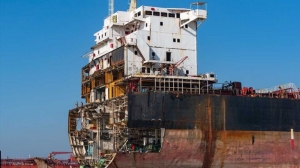


(Posted on 12/06/20)
DNV GL, the world’s leading classification society, has launched a new guidance on recycling to help shipowners navigate a regulatory environment that is becoming increasingly complex. With the IMO Hong Kong Convention not yet in force, strict enforcement of the EU Ship Recycling Regulation (EU SRR) and the EU Waste Shipment Regulation (EU WSR) means shipowners must carefully plan for the end of life of their vessels.
Shipowners looking to make informed, economic and responsible decisions about how to deal with vessels at the end of their lifecycles face a much stricter and more complex set of international, regional and national requirements than in the past. With regulators targeting shipowners with significant financial penalties, even criminal offences, shipowners need a careful and considered strategy for dealing with ship recycling of their vessels.
“Ship recycling is an area where we can see significant pressure building in our industry, both from regulators, wider stakeholder groups and the public,” said Knut Ørbeck-Nilssen, CEO of DNV GL – Maritime. “This means that ensuring compliance is essential for shipowners looking to protect their reputations and businesses, while building trust that their vessels are recycled in a safe and sustainable manner.”
The new guidance: “SHIP RECYCLING: NAVIGATING A COMPLEX REGULATORY LANDSCAPE”, aims to give a better basis for decisions on the recycling of vessels. It sets out the main recycling options, the legal, reputational and financial risks, and provides a process that can help to assess whether an individual yard is likely to carry out recycling to an acceptable level, in line with recognised regulations and standards. This process has been designed by DNV GL to provide owners a template for action, in the absence of internationally accepted certifications outside the EU scheme, when they are dealing with yards not on the EU approved list.
“Recent cases have shown that without a clear awareness of the risks within the complex regulatory landscape that surrounds recycling, shipowners can find themselves facing major financial and opportunity losses,” says Jannicke Eide Fredriksen, DNV GL – Maritime. “With this new guidance, DNV GL is working to support shipowners in their decisions, by setting out the standards involved and the many critical factors to consider, primarily when dealing with yards that are not included on the EU approved list.”
Torvald Klaveness has announced the decision to consolidate all digital services under Klaveness Digital... Read more
The International Association of Dry Cargo Shipowners (INTERCARGO) has renewed its call for straightforward... Read more
The Swedish Club has delivered strong results for 2024, posting a USD 34 million profit and significantly... Read more
In line with NORDEN’s positive long-term outlook for Capesize freight rates, the company have... Read more
OrbitMI, a global provider of maritime software and data products, has expanded its workflow capabilities... Read more
Current ClassNK Senior Vice President Hayato Suga has been appointed as President & CEO as well... Read more
The surge in demand for Cape Size bulk carriers will continue for another six weeks, driven on by increased... Read more
OrbitMI, a leading provider of maritime SaaS software, has announced that Istanbul-based Statu Shipping... Read more
“The International Association of Dry Cargo Shipowners (INTERCARGO) is deeply saddened by the... Read more
As the shipping industry continues its transition to carbon-neutral fuels, ammonia and hydrogen are... Read more